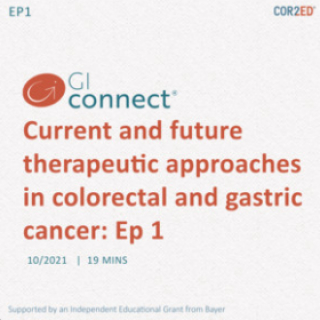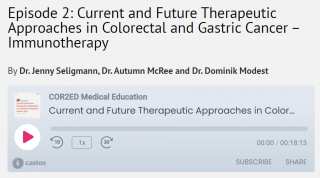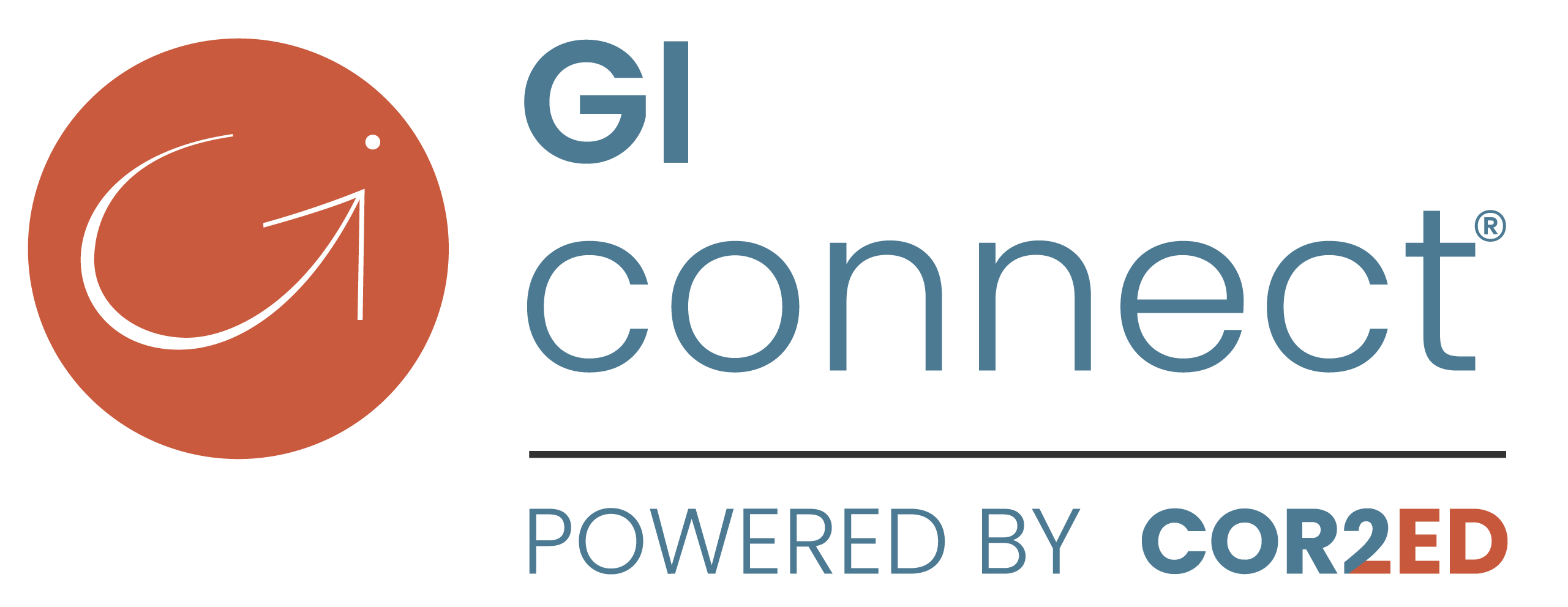Dominik Modest
Hello everyone, this is the first GI CONNECT podcast series on gastrointestinal oncology. It has three episodes; we are now covering episode two: immunotherapy approaches in metastatic and advanced colorectal and gastric cancers. My name is Dominik Modest, I’m a medical oncologist from the Charité in Berlin, Germany and I’m here with Dr Jenny Seligmann from the University of Leeds and Dr Autumn McRee from the University of North Carolina in the US. Welcome to both of you.
Before we start, we have been addressing a few additional targeted questions and agents in the first episode and now really focus on immuno-oncology in gastric and colorectal cancer, and in particular on recent developments.
So, the first question that I’d like to send to Jenny Seligmann is: what do we do with MSI-high metastatic colorectal cancer? Should we use immuno-oncology agents alone, should we use combinations of them, or should we go a step further, like in other entities like lung and gastric cancer and try to combine immunotherapy with classic chemotherapy?
Jenny Seligmann
Sure, thanks Dominik. So, there's been a lot of really exciting developments in MSI-high colorectal cancer and we're now in a position where we have really solid first line data. So, I think we can feel quite firm in our beliefs, that we should be treating these patients with IO in the first line. So, KEYNOTE-177, of course, give us this randomised data, and then we can, my response will build upon that data.
So, in that trial, what we saw was single agent NIVO was patients had improved PFS, they had a good response rate and really importantly, they had durable responses. So, there's a lot of patients that are going to do really well from these drugs anyway. Another huge stand out from the NIVO data was the toxicity and the quality-of-life data. And this is, this is really important, because I think we need to consider that in this patient population, there are quite a lot of elderly patients and we need to think about those patients as well, not only those who were recruited to the trial.
However, we've also got data from CheckMate 142 that was presented in ESMO 2020 showing us that NIVO IPI is showing improved response rates and so is there a subset of patients that actually will be better with this initial increase in efficacy? Again, that regimen was well tolerated with low-dose IPI so again that feels like a really good option, so I suppose, how do you select the patients that should have combination instead of single agent, knowing that a lot would have done well with single agent anyway?
So, if we go back to KEYNOTE-177 some things that might jump out, and so number 1. there was an early cross over of the curves. Who are these patients, how can we identify them? We also have young patients with potentially resectable disease or high burden disease, they may be better with a doublet approach rather than a single agent. And there was some hint in the subgroup analyses that the KRAS mutant patients might not do quite as well as the other biomarker groups so there would be some groups that I would think about giving combination to, but certainly I think there's a big role for the single agent and, of course financial toxicity may come into that as well, in terms of what’s deliverable.
In terms of combination with chemotherapy, this is of course an interesting route as well, particularly again with these patients who seem to progress quickly on single agent NIVO and as I understand that are several ongoing trials, so hopefully we'll get some answers from those.
Autumn McRee
I think the real concern, I agree, I think the ability to give somebody a single agent immune checkpoint inhibitor in the first line is really appealing. I think the emerging question will really be, you know, what do we do for these patients when they grow resistant to immunotherapy and are we going to be able to rescue them with chemotherapy or is the runway going to be so much shorter at that point but I think, certainly the trial data is convincing enough and, of course, you know, in the United States, we have an approval now to give IO as a single agent in the first line setting.
Dominik Modest
So, I assume there's a certain clarity, how to proceed with metastatic colorectal cancer, we just have one Phase 3 trial, which is convincing in itself, and we are waiting more. And I think it's not that easy and in terms of gastric cancer, I think the data that have been presented, I think over the year 2020 and at least, are to be awaited for the next years - I think there are many, many, many trials running, and some of them will be presented during 2021 and in the course of the next 2, 3, 4 years and affecting not only metastatic gastric cancer patients but also patients with localised or advanced disease. But I think the data that we have are more or less focused on metastatic disease, so what would your standard at the moment be, where do immuno-oncology agents fit best for whom in gastric cancer and what are the options that you are eagerly waiting for, or the problems that you foresee for the near future to implement further drugs into that setting?
Autumn McRee
Yes, I mean this was certainly, this was certainly an area where we were inundated with data almost so quickly that, you know, trying to sort it out has been somewhat of a challenge. You know, we sort of started 2020 with, at least in the United States, an approval for pembrolizumab for patients in the third line setting and now we have multiple trials looking at how to bring immune therapies into earlier lines of therapy. The challenges with some of these trials is that they've combined a lot of different cohorts of patients, so you know, KEYNOTE 590, which was a first line study looking at pembrolizumab with chemotherapy versus chemotherapy alone included patients with both squamous cell and adenocarcinoma I think that trial was certainly driven largely by the 75% of patients who had squamous cell carcinomas of the oesophagus.
But the CheckMate 649 study really was the study that looked at the role of immune checkpoint inhibitors with chemotherapy and adenocarcinomas. And I think for my practice, what I’ve taken away from this study is that certainly patients with a PD-L1 expression score, CPS score, that is higher seem to derive more benefit from these drugs, so in that trial when they sort of did their subset analyses of patients, whose tumours had CPS scores less than five, or less than one, the survival just wasn't as significant and so, at least in my practice I think if you, you have an adenocarcinoma with a CPS score that's at least five, then I think it's very reasonable to combine nivolumab with chemotherapy. I think we just have to be really cautious that we don't expose patients to the potential toxicity of an immune checkpoint inhibitor if we don't think they're going to get the benefit. I think KEYNOTE 062, which actually was a first line study that looked at the role of pembrolizumab versus chemotherapy alone versus pembro plus chemo, really gave us some good information about patients whose CPS scores are higher and so, in that study it looked like if the tumour CPS score was greater than 10 then there was a role for single agent pembrolizumab, and so I think that's a really important niche patient population that we shouldn't miss for gastric cancer, if they do have a higher CPS score, then I think, giving them single agent pembrolizumab is another option, depending on the bulk of their disease.
Dominik Modest
Thanks a lot, quite interesting. I think for the use of immuno-oncology agents for gastric cancer you just mentioned you're working with the CPS score and I always wonder with all these populations CPS negative greater than one, greater than five, greater than 10 from different cohorts it seems quite irritating from the outside, to define the cut-off, to understand the cut-off, so at least we, I think, work with that because the labels come with the CPS score, what else, in terms of biomarkers did you use to see patients with gastric cancer - question goes to both of you, as for potential immuno-oncology approach?
Autumn McRee
Well, I would argue too, even more challenging is when the approval comes without the biomarkers, so you know, at least in the United States, the FDA has approved both nivolumab and pembrolizumab here in the last two weeks in the first line setting, neither one of which came with a companion biomarker and so you have to be really cautious that in these settings where you're not having to show a companion biomarker, that patients aren't just blanket, you know, being treated with these drugs when the data really hasn't been digested appropriately.
I think what's also somewhat alarming is when you look at these subsets and you look at some of the studies where patients, you know, without expression, you know or low expression, have really high response rates, you know, there's always some discordance in these trials and so it's just really hard when you're navigating this in the clinic to say, okay well if this CPS score’s really low does that mean you're just absolutely not going to have a response and should I not at least try this. I think, unfortunately we're not left with another good option at the moment, so we really haven't seen another emerging biomarker for immune therapy from a predictive response. I think it's going to be more complicated than just one potential gene expression, I think there's going to ultimately need to be some sort of signature approach here, where you know, you have a cadre of genes that pretend a better response like we've seen with some of the melanoma data.
Jenny Seligmann
Yeah I mean the field of predictive biomarkers has forever been quite difficult in gastrointestinal cancer, I mean, you just look back to cetuximab and panitumumab and the number of patients that are required to be really confident that you're identifying robust predicted biomarker. I think it's a very difficult field, and to go back to colorectal cancer, there hasn't been a particularly convincing biomarker that's been presented, PDL-1 hasn't been shown to be particularly helpful. TNB might show some promise, but again, some of the difficulty will be with the number of patients that are available to then be able to prove a biomarker is indeed predictive, so I think this is going to be a difficult area, but one of intense research, I suggest over the next five years or so.
Dominik Modest
Thanks. I think, to sum up a bit that point in between the discussion I think we're all struggling that apart from MSI-high patients to identify the patients in gastrointestinal cancers that are ideal candidates. I think, with the CPS we have something that can be used in the upper GI cancers, but at the moment, maybe I’m a bit more worried about the MSS patients and colorectal cancer presenting the vast majority, at least in the metastatic context. Has anyone, an idea which patients out of this population, are they patients that could benefit from immuno-oncology approaches? And with which biomarker, potential biomarkers?
Jenny Seligmann
So, I think this is a really good point I mean there's been it's really exciting the immunotherapy in colorectal cancer, but we can't get away from the fact that this represents 45% of the entire population, so any strategies for MSS patients are really important. I suppose it's a two-pronged thing; so, number one: are there patients that respond to NIVO IPI for example within the MSS population? So, we're going to talk about the NICHE trial in the next episode, but you know, there were patients that had pathological responses who had proficient mismatch repair, there's also been an article in JAMA Oncology looking at durva/trem suggesting that there is an overall survival benefit with the combination compared with best supportive care in unselected patients and they go as far as to suggest TMB might be helpful. But, again, there was no PFS benefits, so I think the jury's certainly still out on that.
The main strategies in MSS at the moment is looking at a combination modality to evoke an immunogenic response that will then allow checkpoint inhibition to be applied successfully, so there's multiple strategies being tested currently with, in combination with anti EGFR agents. There is the TRIBE group have FOLFOXIRI plus bev + atezo trial. There are combinations with vaccines, there's novel approaches so, for example, with agents that are targeting other stimulatory or inhibitory co-receptors such as LAG-3 so there's a lot going on.
There have been some important negatives so, for example, the MODUL trial was negative which looked at atezolizumab with fluoropyrimidine plus bevacizumab versus chemotherapy plus bev alone and IMblaze so I think there's some way to go, it’s a very active field - there's lots of trials, there's lots of ideas, so I hope in time we’ll find signals even in sub populations within the overall populations, but at the moment there doesn't seem to be a focus into a particular biomarker group.
Dominik Modest
Autumn do you want to add something?
Autumn McRee
Well I’ll say, from a personal perspective, you know I think we do have preclinical data, that there is potentially some synergy between inhibiting the EGFR pathway and up-regulating the potential for response to immune checkpoint inhibitors, you know, our group did present at ASCO GI 2021 a Phase 2 study that looked at the combination of panitumumab with NIVO IPI for patients with microsatellite stable metastatic colorectal cancer. The study did meet its primary endpoint it was a non-randomized study, but I’ll say you know, sort of, from a personal standpoint treating these patients, the duration of responses that we saw for patients who really shouldn't have responded to immunotherapy was very impressive. So, I think you know, having good tissue on these patients that are enrolled on these trials so that we can go back and learn, you know, who were these patients that have these durable responses and why did they have these responses and you know, what was it about their immune micro environment that made them, you know more sensitive, I think we're going to learn a lot from these patients who enrol in these trials.
Dominik Modest
So, I think it's fair to conclude at this point that we have a certain panel of potentially predictive biomarkers for colorectal cancer, which is MSI high, we have the same biomarker for gastric cancer, which is complemented by CPS scoring which does maybe less good, but still working, and in MSS colorectal cancer, I think it's fair to say that we do kind of a reverse translation so we're having a lot of ideas we have understood that immuno-oncology approaches and MSS colorectal cancer requires combination, and I think creative combinations and that we will have to learn mechanisms from clinical signals rather than we understand the whole system up front and put it into clinic, so we're really trying to define strategies; what we have in terms of treatment options and then try to identify backwards, who is responding or not, which is a very successful paradigm, I think, in colorectal cancer when Jenny just mentioned EGFR inhibitors I think they were never understood in the lab but, in fact, while treating patients and appears very similar in metastatic colorectal cancer with MSS tumours we’ll have to learn from the patients.
I think that could be a nice end of the episode, thank you very much for joining, and thank you very much to Autumn and Jenny for the very nice discussion.











 Downloadable
Downloadable  20 MIN
20 MIN
 Feb 2026
Feb 2026 







